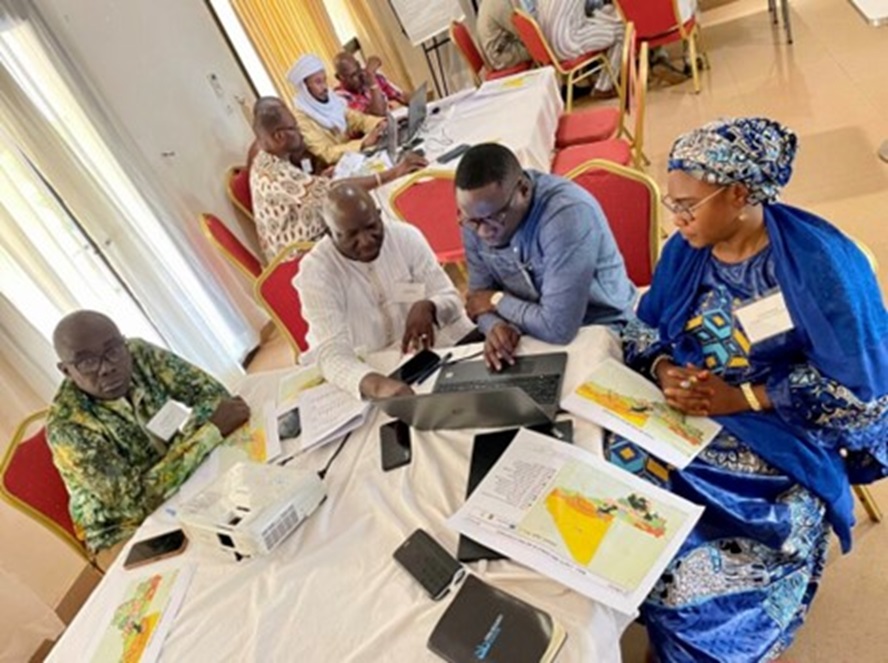Implementing development programs in the field amidst recurring conflict, unpredictable logistical challenges, and seasonal weather complications requires much more than just comprehensive strategic planning. The Famine Early Warning Systems Network (FEWS NET) Pillar 3 project found that success hinges on building meaningful partnerships with local actors and intentionally investing in their capacity strengthening.
Over the past 39 years, FEWS NET has provided leadership and critical early warning analyses on food security for USAID and other humanitarian agencies worldwide. The project, which has been implemented by Chemonics since 2000, uses a livelihoods-based approach to examine how shocks—whether climatic, market-based, or conflict-related—impact local livelihood systems and households’ access to essential resources necessary for survival and prosperity. FEWS NET forecasts food insecurity and informs decisions on humanitarian planning and responses in the world’s most food-insecure countries. FEWS NET’s livelihoods-based approach to early warning and food security analysis is rooted in Household Economy Analysis (HEA), which is a framework that helps understand how households of different wealth levels manage their environment and assets and how they interact with the broader economy. HEA baselines are the starting point to FEWS NET’s contextual and forecasting analyses.
Since November 2022, FEWS NET has partnered with USAID to develop and update HEA livelihood baselines for six countries, including conducting fieldwork in Mali to update their baseline profiles. This posed a particular challenge as the team had to conduct rigorous fieldwork in 16 livelihood zones across the 1.24 million km2 of Malian territory amid the peak rainy season and in volatile areas within the brief span of 6 months. During this time, security threats in the Northern regions, such as Mopti, Gao, Kidal, and Timbuktu, coupled with geographical inaccessibility, posed extra challenges to the already arduous endeavor.
The key to overcoming these challenges and effectively updating Mali’s livelihood baselines was to integrate a localization approach through two key elements: a) recognizing local expertise and partnering with local stakeholders, and b) investing in strengthening local capacity. Given Chemonics’ long-standing role with FEWS NET, it has had the opportunity to build strong, reciprocal relationships with local organizations. This foundation supported the project in effectively updating Mali’s livelihood baselines, showcasing the power of locally led development while delivering impactful short-term results and laying the groundwork for lasting sustainability in regional livelihood expertise.
Recognizing Local Expertise and Partnering with Local Stakeholders
The FEWS NET team established a strategic partnership with Mali’s Early Warning System (SAP), a government agency that leads national food security analyses and response plans in collaboration with other government ministries and international organizations. The project developed a strategy that identified and capitalized on the HEA knowledge of SAP agents while investing in enhancing their technical skills. Through this partnership, SAP agents co-lead the national data collection efforts, integrating their staff into the fieldwork teams to serve as team leaders and regularly participate in planning sessions.
The partnership proved successful due to the alignment of objectives with SAP’s, ensuring that both parties had complementary goals. Integrating SAP’s nuanced contextual insights into the planning and implementation phases allowed the team to identify SAP’s strengths and expertise early on, which was key to navigating on-the-ground realities such as ethnic sensitivities and security risks.
In Mali, more than ten ethnic groups speak more than 14 languages. Given this culturally rich and complex national landscape, centering the perspectives of local stakeholders and engaging them throughout project design, implementation, and evaluation ensured that fieldwork activities were responsive and appropriate to the local context. For example, SAP agents recruited and integrated data collectors from diverse Malian communities and ethnic groups which streamlined accessibility and safety and promoted local ownership of the data collection process.
On the other hand, the project regularly faced security and accessibility challenges when mobilizing teams for data collection in Mopti, Gao, Kidal, and Timbuktu, which are areas that have been affected by conflict. Leveraging the partnership with SAP, which had local agents in the north, allowed the project to tap into their contextual understanding of the study areas and leverage their community connections to safely and effectively complete data collection.



